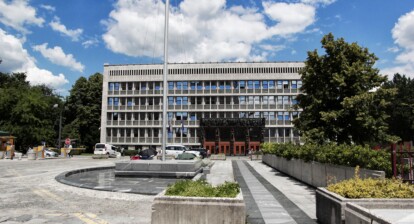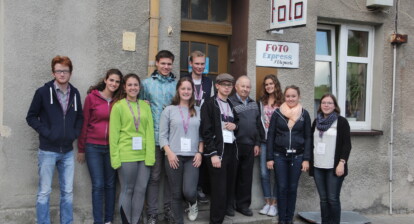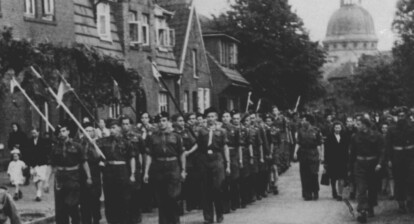Tamara from Slovenia interviewed her grandmother about her experience of deportation during WWII.
I was firstly acquainted with the topic of exile when I was a little child, since my grandmother experienced forced exile during the Second World War. Consequently I heard many stories of her from that period in her life, but to get more detailed and accurate information I conducted an interview with my grandmother Marija Čakić.
Marija was born on 23 th of November 1934 in little village called Lahonci (70 km from Maribor). She lived her childhood years in that village with her parents, three younger brothers and a younger sister. Her mother stayed at home and took care of five children and home, while her father earned money as a mason in a nearby city of Ptuj. It was even before Marija turned 7 years, when she had to face cruelty of the Second World War. It was harvesting time in 1941, 19th of July to be more exact, when two German soldiers knocked on the door of her home. They said that the family has to be exiled. At that time only mother and five children were at home, while father was working in Ptuj. Two armed soldiers made them pack few belongings and leave their home as quickly as possible. This was extremely stressful situation for Marija’s mother, since she was forced to move with five children and the oldest one (Marija) was only six years old (brother was lso 6, the second brother was 3, sister 2 years old and the youngest brother only 7 months old). At the same time Marija’s grandmother and aunt, who lived in a nearby house and another family from that village were moved too.
One of the peasants from their village took his cart and took the family to nearby village Sveti Tomaž. There they were picked up with a truck and transported to military barracks in Melje (in Maribor) where they stayed for few days while waiting to be exiled from their homeland.
Few days later a goods train took them to Slavonska Požega (Croatia), where was Ustashi (Ustaši) concentration camp. They did not stay there for a long time, shortly afterwards the family was again transported. Their next stop was Bosanska Krupa, a city in today’s Bosnia and Herzegovina. At that time Bosanska Krupa served as an assembly point for exiled people.
Marija and her family were moved from the city of Bosanska Krupa to the countryside that surrounded the city. The countryside and the house they live in were abandoned and there was no food available to feed the children. There were only few sheep grazing and there were few fields of cereals, since people were forced to leave the countryside and did not have time to harvest it. Marija’s mother succeeded to survive her children with cooking them cereals from nearby fields.
However, poor mother had to survive another cruel experience since her youngest child, who was not even one year old, got sick and almost lost his life.
After a while, family was moved to the city again and from there to the city of Okučani in Croatia. There they stayed at one peasant’s house where Marija and her brother served as shepherds. The peasant and his wife were not very generous or charitable and provided the young family with amount of food that was just enough to survive.
From Okučani they were moved to a village Gunja on the border between Croatia and Bosnia. Owing to Marija’s mother’s persistence and firmness the family was moved to Nova Gradiška (Croatia), where the family also stayed before, but just for a couple of days, and where the situation was slightly better. The family was finally stayed there until the end of the war (June 1945).
We could conclude that my grandmother’s family was quite lucky, since they all survived the war. However, they were faced with a stressful experience of exile, living in a foreign country, lacking food and other necessities of life and living day by day with the tumult of bombs, strike aircrafts and machine guns. In almost four years of exile family survived all the cruelties of war and returned to their homeland where they were reunited with their father.
However, the situation of exile was perhaps a bit easier for them, because of the fact that the culture of the country they were deported to was not completely unfamiliar to them. Croatia is a neighbor country and the Croatian language is quite similar to Slovenian. The period of living in Croatia caused that children learned Croatian language. As grandmother described, the day when the family and other Slovenian people returned from exile they were singing Partisan victory songs in Croatian language.
When I asked my grandmother about consequences of being in exile, she said that there aren’t any special consequences she could emphasize. Of course there are unpleasant memories of being deported to a foreign country, of living in indigence, of moving from town to town, of living in a war-time and of almost loosing a younger brother, but none of this is special or uncommon for a person who survived a war.
Yet, during our conversation my grandmother reached a new conclusion. When I asked her how she feels about her homeland, if she has any special feelings towards it, because of her experience, she said she would never leave Slovenia. She also admitted that all her late childhood and adult-life she was (and still is) extremely homesick. At that point she also told me a story from her teenage life after the end of the Second World War.
At the time of her teenage years it was normal for children, who lived in the countryside, to leave home and go working/serving to some other family as shepherds or just as helpers on farms. Consequently all the grandmother’s brothers and sister left their home and went to serve for few years too. But my grandmother was an exception in her family. She was sent to serve one lady at her farm, but grandmother stayed there only two days and then run away to her grandmother’s house, because she was afraid to return home. After couple of days her mother found out and went to pick her up and return home. When she was back at home her father told her she should return to that lady, but my grandmother replied that she does not care if she “ever again eats bread at home, but she will not return to that lady or ever leave home”.
I believe that this story tells everything about consequences that exile left on my grandmother.
However, with regard to the cause of her exile it is hard to determine one. It is a fact that German occupier planned deportation of people in that part of Slovenia. Yet it is interesting (as my grandmother says) that only two families were exiled from their villages (my grandmothers close family and her aunt and grandmother who lived nearby and another wealthy family). What makes it harder to understand reason that exactly her family was deported is a fact that they were not rich or wealthy and were not politically active. As my grandmother said, after the war ended and after they returned to their home there were rumors about one peasant who allegedly collaborated with the occupier, but those rumors were never confirmed and that peasant also moved away from that village.
However, I am not even sure whether there is any point in searching for a logical and reasonable cause why my grandmother’s family was selected to be deported – this is now just a fact and tragic experience in life of my grandmother, her family members and many other displaced people.







Roksolana Melnyk
In my experience (my interviewee was also deported), deportation is the worst form of exile as you depend on unpredictable and unknown circumstances; the only thing you are left to do is to submit.